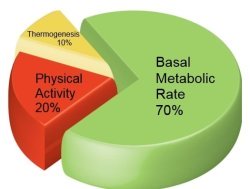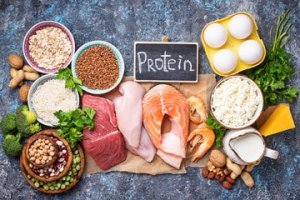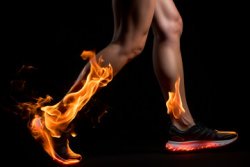Burning Calories


Burning calories through exercise is one way to help you reach your weight loss goals. But did you know that you are expending calories even when not exercising?
You use energy and burn calories everday with each simple and complex task you do. You even expend energy while sleeping. Your BMR (Basal Metabolic Rate) is responsible for this expenditure of energy and is responsible for up to 70% of the calories you burn each day
Although a slow metabolism is often blamed for weight issues, this is rarely the case for most people.
Even though metabolism influences our bodies basic energy needs, it is the foods and drinks we consume and the level of activity we get that are generally the culprits behind weight gain.
What is BMR?
Your BMR (basal metabolic rate) is the amount of energy you expend for basic body functions like breathing, digesting, blood circulation, growing and repairing cells and other basic needs.

The metabolic rate for each person varies and depends on certain factors. These factors include body size and composition, age and gender. Each of these factors plays a role in burning calories and the rate at which you expend your calories.
For instance, a heavier person or someone with lots of muscles will have a higher BMR. This is due to the fact that their bodies require a higher amount of energy to maintain basic body functions.
Age also plays a role in the amount of calories burned. As we age our metabolism slows down. This is generally due to loss of muscle. Muscles are more metabolically demanding and as we lose muscle the amount of energy needed also decreases.
Lastly gender impacts the amount of calories we burn. Men tend to have more muscle mass and therefore tend to have a higher metabolism.
Burning Calories Beyond BMR
Burning calories beyond your BMR is influenced by two other factors. The first is thermogenesis, or food processing. This process includes digesting, absorbing and transporting the energy (or foods) you consume.
This process accounts for approximately 10 percent of the total calories burned during the day. The energy requirement for this process stays fairly consistent and is not easily changed.

The second item for burning calories other than your metabolic rate is your activity level. This variable accounts for the remaining amount of calories you burn in a day.
All physical activity including structured exercise, walking the dog or playing a sport fits into this category.
Since we cannot change our gender or age, and the energy it takes to process food stays fairly consistent, our activity level is the one area in which we can maximize our calories burned for weight loss.
Burning Calories-Maximizing your Exercise Routine
In order to lose weight a person needs to consume fewer calories than they burn. You could simply reduce the amount of calories you consume and reach your goal. However, if you want to lose weight faster, and keep it off, then burning calories by changing your physical activity is the best approach.
With exercise you are not only expending calories, you are increasing muscle mass. As stated earlier, a person's body size and composition play a role in your metabolic rate.
So by increasing muscle and losing fat through exercise you are positively impacting the two factors you are in control of for burning calories faster.
Here are some methods so maximize your exercise routine to get the most from your workout.
Eat Right
You want to get the most from your workout so be sure your body is prepared. Don't exercise on a full stomach but also don't exercise without energizing your body.
Try eating a low carb, high protein small meal 90 minutes before your workout.
With the proper fuel you will be able to exercise harder and longer and maximize the amount of fat and calories you burn.
Just Breathe
Breathing is an important piece to your workout. You want to ensure you provide the proper oxygen to your body and muscles. Fat needs oxygen to burn, so with proper breathing you are maximizing your fat and calories burned. Try inhaling and exhaling through your nose and not your mouth. This may take some time to get used to but keep practicing and it will feel natural after awhile.
Strength Training

Make sure to include strength training in your weekly routine. Remember muscles are more metabolically demanding so the more muscles you have the higher your metabolism.
Use resistance bands or dumbbell weights if you don't have access to a gym or weight lifting equipment. You can even do body weight exercises to increase muscle strength.
If you are including strengthening exercises and aerobics in the same workout, start with the strength training for a maximum fat and calorie burn.
It takes your body about 15 minutes to warm up before it starts to burn fat. Since strengthening exercises burn fewer calories, but does help warm up the body, starting here allows you to warm up the body as well as build muscle.
Then when you get to the aerobic section you will be burning calories and fat right from the start.
Aerobic Exercise
Don't just focus on strengthening exercises. To really get a great calorie burn, include aerobics 3 to 4 times a week for a minimum of 30 minutes. The longer the duration or the harder the workout, the more calories you will burn.
You can walk, jog or run using your treadmill or soaking in the weather outside. Buy or rent some exercise DVD's, go swimming or even cross country skiing. Any form of aerobics will be burning calories and fat and helping you lose weight. Even fun activies help with burning calories.
Calories Burned During Exercise
Understanding calories burned during exercise can maximize your workouts. When trying to lose weight many people incorporate a weekly exercise routine in addition to eating healthy. Studies show that those who add exercise to their weight loss plan versus those that only diet tend to lose more weight in the same period of time. If you have decided to add exercise to your weight loss plan, that’s great!

In order to get the most from your exercise then you want to understand your exercise calories. In other words, you want to know how to calculate calories burned. Certain exercises will give you higher calories burned during exercise while others may give you more fat burning benefits while still others will give you the benefit of raising your basal metabolic rate.
What is an Exercise Calorie?
Although the word calorie has various definitions, the ones we think of when talking about weight loss and exercising are “a unit of measure for the energy value of food” and “a measure of energy expenditure”.
This second definition is what many refer to as exercise calories. You are expending or burning calories when you are doing leisure activities, gardening or even cleaning the house. While these activies are burning calories, we don't think of them as an exercise calorie.
Exercises calorie are the calories you expend, or burn, by performing specific exercise activities like walking, jogging, swimming and many other types of workouts. There are literally thousands of different types of exercises you can do and each will produce a different number of calories burned.
Calories Burned Through Aerobics
In general, aerobic exercises will give you the higher calories burned during exercise. Aerobic exercises require oxygen, and fat needs oxygen to burn, so your aerobic exercises will give you a greater fat burning benefit in addition to the higher calorie burn.
Don't just focus on exercises that expend more calories during exercise. You also want to include in your weekly workout routine some strength training exercises. These types of exercises will help tone and strengthen your muscles and build lean muscle mass.
The more lean muscles you have the higher your BMR, thus the more calories you will burn doing everyday activities.
Variables Used in Calculating Exercise Calories

Everyone knows that you are burning calories while exercising, but do you know how the exercise calories are calculated and what information is used to calculate the number?
There are many free exercise calorie calculators available on the web where you can type in certain information and get the results of your exercising efforts. These calculators make our lives much easier when we are trying to track our exercise calories.
The results that are returned from these calculators are not an exact figure, but rather a good estimation of how many calories you burned during your exercise routine.
Why is this calculation just an estimate? Well, understanding how this is calculated will help you understand why it is not an exact scientific figure.
There are various factors that are used to calculate the exercise calories. These factors include;
- Weight
- Activity
- Intensity level of the activity
- Duration
Although some exercise calculators include gender and age as one of the selections, this really is not part of the calculation for burning calories during exercise. These calculators may use this information to provide you details on your target heart rate zone.
How it's Calculated
The calculation for exercise calories is actually very technical and as stated above, not an exact science. In order to determine your exercise calories, you must know the metabolic equivalent, or MET, for each different type of activity. The MET is a relative measure of intensity.
The formula for calories burned during exercise is as follows;
So, if a person weighing 68 kg did low impact aerobic exercises for 30 minutes, the calculation would be;
To figure out the MET, let’s complete the calculation – time to get out the algebra books to figure this out. Let’s use the variable c for calories burned and variable m for MET. The formula would look like this;
c= 30 X (m X 238)/200
c= 30 X (m X 1.19)
c = 35.7 X m
Of course this does not solve the equation because we have two variables, but if we use an exercise calorie calculator and select the correct information (68 kg for weight, aerobic, low impact and 30 minute duration) it will return an answer of 180 calories. So now we can provide our formula with the 180 calories and it would now look like this;
If we divide each side by 35.7, we now have the answer to our MET variable of 5.042017. As stated above, the MET is different for each different type of exercise and intensity level. This is why the value is an approximation and not an exact science. Math lesson is over for the day (whew!).
Calories Burned with Fun Activities
Most people think of exercise when they hear the words burning calories. But you can have fun while burning those unwanted calories and shed excess pounds. Here are several fun activities you can add to your weekly routine to create your calorie deficit.
Leisure Activities and Calories Burned
Here's a short list of some fun leisure activities and the calories burned while having fun with these activities.
Archery
Hit your calorie target with archery as a fun activity. Just 30 minutes of shooting your bow and arrow can burn approximately 129 calories.
Bowling

Although this is not often thought of as an extremely active sport, you will be burning calories just the same. Just one hour of bowling and you can burn 180 unwanted calories. Go for a full hour and a half and this number increases to 270.
Croquet
Get out the old croquet set and play a game with your family in the backyard. Not only will you be enjoying the sun and spending quality time with your family but you can burn 95 calories in just a half an hour.
Fishing
If you love to fish, then this is the perfect outside activity for burning calories. Even just a half an hour can burn up to 100 calories. Of course if you haven’t caught the big one by then, go for longer in order to have a fish fry and burn more calories.
Frisbee
Play at the park with your kids or your dog. Playing Frisbee for 30 minutes can expend about 110 calories. Although your arm may give out before your dog does, at least you’ll get some fun in with this activity.
Golf
Of course this wouldn’t be a complete list of leisurely activities without mentioning golf.

30 minutes on a driving range and you can burn almost 100 calories.
Make it a full game of golf and in 30 minutes you can shed 115 calories using a cart. Forego the cart and burn up to 165 calories in just 30 minutes.
The full course may take longer then 30 minutes. Good news is that means you will burn even more calories with this fun activity.
Other Leisure Activities
Other fun leisurely activities for burning calories include rock climbing (30 minutes = 248), hiking(without a pack for 30 minutes = 256), horseback riding (at a trot = 240), downhill snow skiing (30 minutes = 260) and even playing with your kids can burn in excess of 100 calories for just 30 minutes.
Sports and Calories Burned
In addition to the above fun activities, check out how you can achieve burning calories with these sports.
Bicycling
Go on a bike ride and enjoy the weather. Go with a friend and find a good riding path so you can make the most out of this fun activity. Even just 15 minutes of a leisurely bike ride can expend 75 calories.
Make it more intense and longer and you will burn even more calories plus build lean muscles in your legs.
Badminton

At your next BBQ, get out the net and racquets and play some badminton.
A fun 20 minute game can burn upwards of 100 calories.
Go for an hour and reach up to 300 calories burned while having fun and kicking butt.
Basketball
Maybe this sport isn’t for everyone but give it a try for a fun change. Playing hoops just for fun with your friends for 20 minutes can burn over 140 calories. Make it a real game and challenge and you will burn about 240 calories for those same 20 minutes.
Handball
This is a great way for burning calories in a short period of time. Of course this sport takes some skill and practice but even if you haven’t mastered it you will be getting a great workout and helping you to lose weight. Just 30 minutes of play equals 380 calories burned.
Hockey
If you love to skate and always fantasized about being a star, then try this activity to burn calories and play out your fantasy. In as little as 30 minutes with this sport you could burn 300 calories.
Racquetball
This fun sport is another high calorie burning activity. In just 30 minutes of a fun and friendly game you could be burning over 300 calories. Go for an hour and you will expend over 600 calories.
Softball

A friendly game of softball at your next family reunion is just the ticket to burn excess calories.
Team up with or against the in-laws and hit your home run to burn about 200 calories in just a 30 minute non-competitive game.
If you get the winning home run, who knows, you may no longer be the black sheep of the family.
Other Sports
Other sports that can help you burn calories include soccer (30 minutes of a leisurely game = 320), squash (30 minutes = 338), table tennis, or as I like to call it, ping pong (30 minutes = 150 calories) plus more. Try these other sports for burning calories burned while having fun like regular tennis on the courts (30 minutes of singles = 295 calories and doubles = 198) and of course my favorite, volleyball (30 minutes = 115 for a leisure game, 198 for a competitive game and 297 for beach volleyball).
Additional Articles
Benefits to Exercise
In addition to burning calories, exercising has many more benefits. Read this article to learn more.
Weight
Loss Workouts
Use these example workouts to help you lose weight. With different difficulty levels, you are sure to find one that works for you.
Boost
Metabolism Naturally
Boosting your metabolism can help you burn more calories during the day. Use these unusual tips to help rev up your calorie burning furnace.
